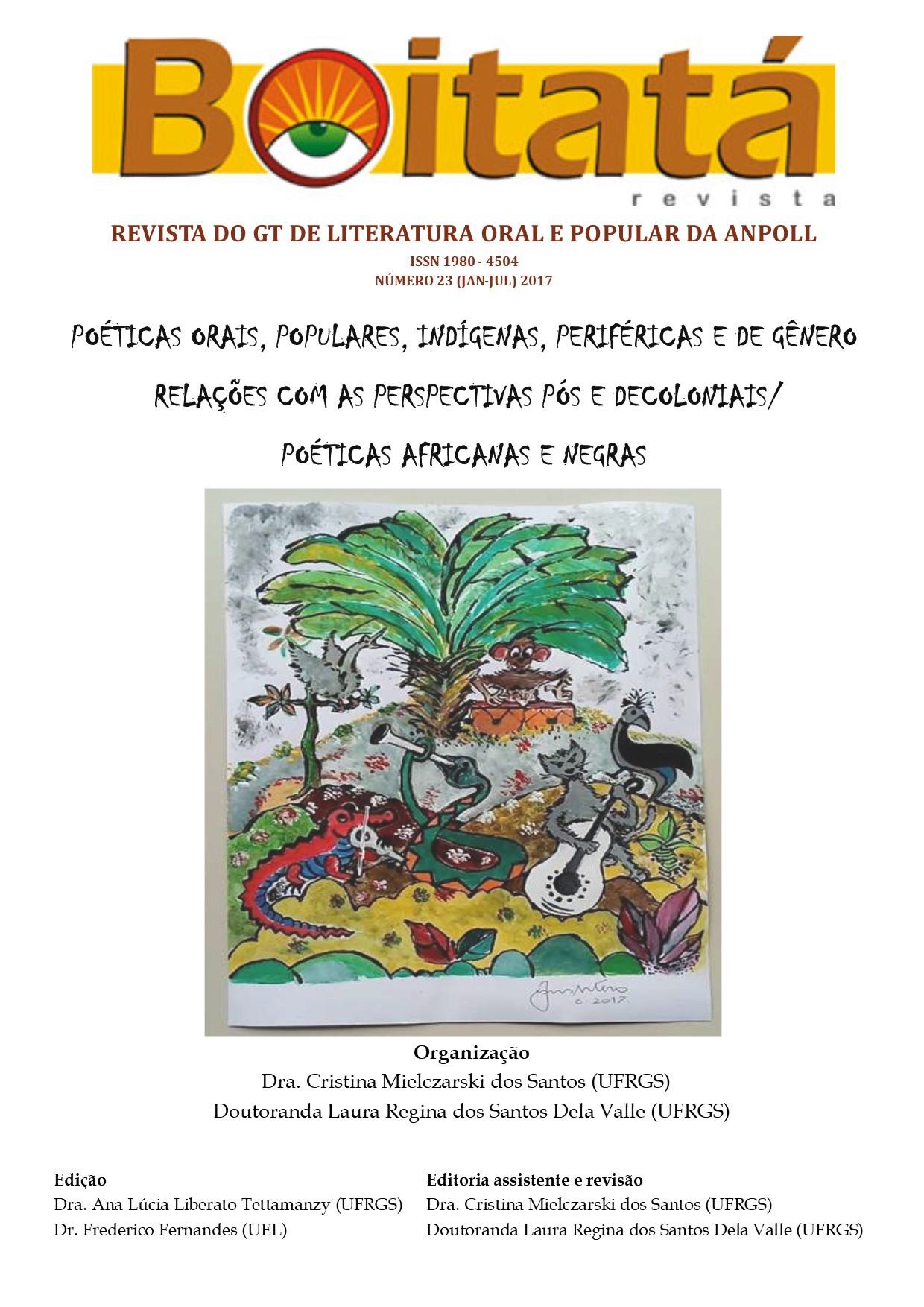Peripheral poetry of female authority as break and resistance
DOI:
https://doi.org/10.5433/boitata.2017v12.e30689Keywords:
Self-representation, Marginal-peripheral literature, Poetry of female authors.Abstract
The poetry of female authorship contained in marginal-peripheral literature, brings the power of resistance and the need to establish the self-representation of women doubly marginalized, both by geographic issue as the issue of gender. Witnesses of the city and the periphery, they cast a critical eye and scathing deconstruction of myths and taboos around female representation, rejecting the obsolete ideas of figuration of muses and bringing women to the reality of their experiences and desires. By breaking with intermediaries and the literary canon that publicize them, peripheral writers establish symbolic space of their speech and bodies by writing poetry. This article aims to highlight the analysis of poems of writers Elizandra Souza, through the work Punga (2007) and Águas da Cabaça (2012) and Luiza Romão, trough the book Coquetel Motolove (2014), aiming to reveal the representation of women through the place of speech writers of the marginal-peripheral literature.Downloads
Download data is not yet available.
References
BEAUVOIR, Simone de. O segundo sexo. Tradução de Sérgio Milliet. Rio de Janeiro: Nova Fronteira, 2009.
BONNICI, Thomas; FLORY, Alexandre Villibor; PRADO, Márcio Roberto (Orgs.). Margens instáveis: tensões entre teoria, crítica e história da literatura. Maringá: EDUEM, 2011. p. 101- 128.
DALCASTAGNÈ, Regina. Representações restritas: a mulher no romance brasileiro. In: DALCASTAGNÈ, Regina; LEAL, Virgínia Maria Vasconcelos (Orgs.). Deslocamentos de gênero na narrativa brasileira contemporânea. São Paulo: Editora Horizonte, 2010. p. 40-64.
DALCASTAGNÈ, Regina. Literatura brasileira: um território contestado. Vinhedo: Editora Horizonte/Rio de Janeiro: Editora da UERJ, 2012.
HAPKE, Ingrid; NASCIMENTO, Érica Peçanha do. É imprescindível que a produção dos escritores da periferia seja reconhecida como literatura. Fórum de Literatura Brasileira Contemporânea, Rio de Janeiro, v. 3, p.215-223, 2010.
NASCIMENTO, Érica Peçanha. Vozes marginais da literatura. Rio de Janeiro: Aeroplano, 2009.
ROMÃO, Luiza. Coquetel motolove. São Paulo: Selo do Burro, 2014. SOUZA, Elizandra. Águas da cabaça. São Paulo: Ed. do autor, 2012.
ROMÃO, Luiza. Punga. São Paulo: Toró, 2007.
TENNINA, Lucía. Afeto, escrita e corpo na produção feminina das periferias de São Paulo. In: BARBARENA, Ricardo; DALCASTAGNÈ, Regina. (org.). Do trauma à trama: o espaço urbano da literatura brasileira contemporânea. Porto alegre: Luminara Editorial, 2015a. p. 301- 333.
TENNINA, Lucía. A voz e a letra da mulher na literatura marginal periférica: figurações e reconfigurações do eu. In: DALCASTAGNÈ, Regina. (Org.). Espaço e gênero na literatura brasileira contemporânea. Porto Alegre: Zouk, 2015b. p. 57-83.
WOLF, Naomi. O mito da beleza: como as imagens são usadas contra as mulheres. Tradução de Waldea Barcellos. Rio de Janeiro: Rocco, 1992.
ZUMTHOR, Paul. Performance, recepção, leitura. Tradução de Jerusa Pires Ferreira e Suely Fenerich. São Paulo: Cosac Naify, 2014.
BONNICI, Thomas; FLORY, Alexandre Villibor; PRADO, Márcio Roberto (Orgs.). Margens instáveis: tensões entre teoria, crítica e história da literatura. Maringá: EDUEM, 2011. p. 101- 128.
DALCASTAGNÈ, Regina. Representações restritas: a mulher no romance brasileiro. In: DALCASTAGNÈ, Regina; LEAL, Virgínia Maria Vasconcelos (Orgs.). Deslocamentos de gênero na narrativa brasileira contemporânea. São Paulo: Editora Horizonte, 2010. p. 40-64.
DALCASTAGNÈ, Regina. Literatura brasileira: um território contestado. Vinhedo: Editora Horizonte/Rio de Janeiro: Editora da UERJ, 2012.
HAPKE, Ingrid; NASCIMENTO, Érica Peçanha do. É imprescindível que a produção dos escritores da periferia seja reconhecida como literatura. Fórum de Literatura Brasileira Contemporânea, Rio de Janeiro, v. 3, p.215-223, 2010.
NASCIMENTO, Érica Peçanha. Vozes marginais da literatura. Rio de Janeiro: Aeroplano, 2009.
ROMÃO, Luiza. Coquetel motolove. São Paulo: Selo do Burro, 2014. SOUZA, Elizandra. Águas da cabaça. São Paulo: Ed. do autor, 2012.
ROMÃO, Luiza. Punga. São Paulo: Toró, 2007.
TENNINA, Lucía. Afeto, escrita e corpo na produção feminina das periferias de São Paulo. In: BARBARENA, Ricardo; DALCASTAGNÈ, Regina. (org.). Do trauma à trama: o espaço urbano da literatura brasileira contemporânea. Porto alegre: Luminara Editorial, 2015a. p. 301- 333.
TENNINA, Lucía. A voz e a letra da mulher na literatura marginal periférica: figurações e reconfigurações do eu. In: DALCASTAGNÈ, Regina. (Org.). Espaço e gênero na literatura brasileira contemporânea. Porto Alegre: Zouk, 2015b. p. 57-83.
WOLF, Naomi. O mito da beleza: como as imagens são usadas contra as mulheres. Tradução de Waldea Barcellos. Rio de Janeiro: Rocco, 1992.
ZUMTHOR, Paul. Performance, recepção, leitura. Tradução de Jerusa Pires Ferreira e Suely Fenerich. São Paulo: Cosac Naify, 2014.
Downloads
Published
2017-09-14
How to Cite
LAGO-LOUSA, Pilar; CAMARGO, Flávio Pereira. Peripheral poetry of female authority as break and resistance. Boitatá, Londrina, v. 12, n. 23, p. 207–223, 2017. DOI: 10.5433/boitata.2017v12.e30689. Disponível em: https://ojs.uel.br/revistas/uel/index.php/boitata/article/view/30689. Acesso em: 25 feb. 2026.
Issue
Section
Seção Livre
License
Copyright (c) 2017 Boitatá

This work is licensed under a Creative Commons Attribution 4.0 International License.
Boitatá esta licenciada com CC BY sob essa licença é possível: Compartilhar - copiar e redistribuir o material em qualquer suporte ou formato. Adaptar - remixar, transformar, e criar a partir do material, atribuindo o devido crédito e prover um link para a licença e indicar se mudanças foram feitas.






















